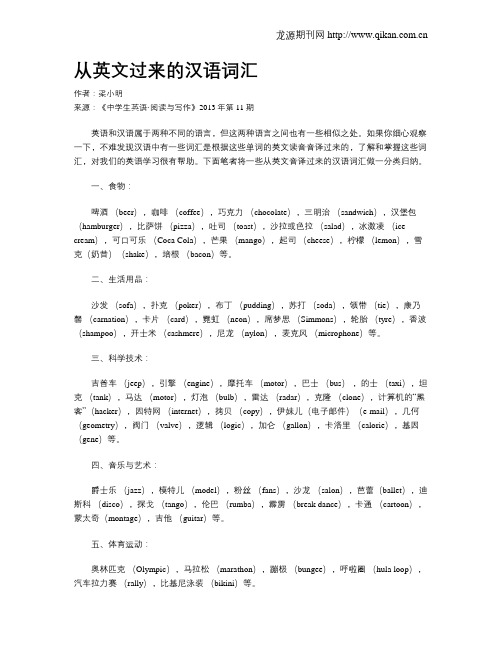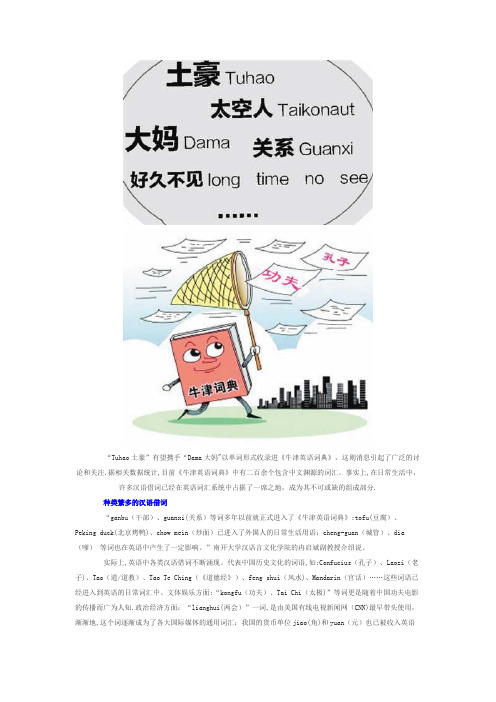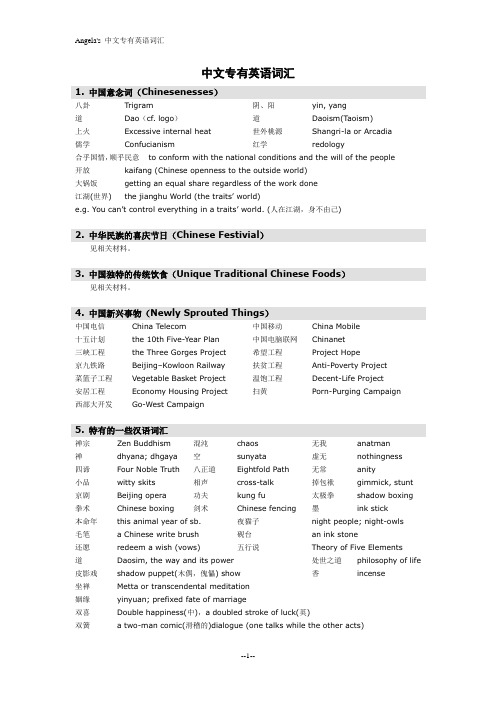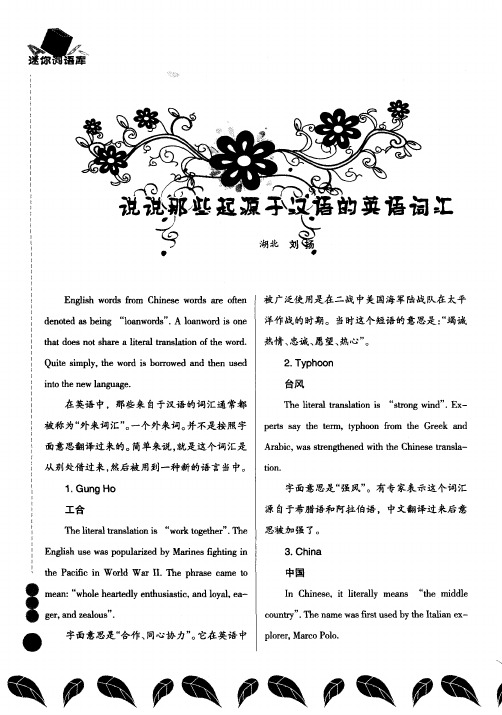英语中的汉语词汇
英语汉语不对称词汇

汉语中有而英语中没有的词汇:
籍贯、户口、无奈、给力、风水、阴阳、太极(tai chi)、缘份、饺子(jiaozi)、功夫(kung fu)豆腐(tofu)、白菜(Pe-tsai)、馄饨(Won ton来自于云吞)、馒头、点心(dim sum来自于粤语)、算盘、磕头(Kowtow来自于叩头)、麻将(mahjong)、乖、馋、气、茶(tea是中国南方方言茶的意思)、道(Tao)、禅、元、二奶、台风(typhoon)、拼爹、扯淡、撒娇、幸福(幸福和happy还是不一样的)、关系、折腾、坐月子、打酱油、铁饭碗、下海、小祖宗、AA制、纸老虎(paper tiger 这个当年翻译的很困难,后来直接用这个,老美还是领会意思了)、绝大部分中文成语
被错用的汉字:
chop-chop 快!快!(筷子)
相近的词:
红茶(black tea黑茶)、急红眼(green eye绿眼)、鸡皮疙瘩(goose bump鹅皮疙瘩)、好久不见(long time no see中式英文)、一箭双雕one stone two birds(一石二鸟)、似是而非的(paradoxical似非而是的)
来自于英语的汉语:
酷(cool)、咖啡(coffee)、体恤、夹克、坦克、引擎、吉普、摩托、摩登、迷你、的士、模特、巴士、比基尼、迪斯科、酒吧、卡片、拷贝、克隆、桑拿、NBA、SPA、布丁、马赛克、镭射、DVD、可乐、汉堡、色拉、热狗、作秀、拜拜(这个西方人已经不怎么用了)、海洛因、艾滋、休克、停摆、弹劾
英语中有而汉语中没有的词汇:
这个得去美国英国加拿大澳大利亚新加坡非洲印度去收集,因为英语是杂种语言artdu@。
【与外国人交流必备】Chinglish——英语中的标准汉语翻译词汇大全

下面就是这些Chinglish说法,其中每行第一部分是汉语说法,第二部分是Chinglish说法,第三部分则是英语的标准说法。
①欢迎你到... ②wele you to ... ③wele to①永远记住你②remember you forever ③always remember you(没有人能活到for ever)①祝你有个... ②wish you have a ... ③I wish you a ...①给你②give you ③here you are①很喜欢... ②very like ... ③like ... very much①黄头发②yellow hair ③blond/blonde(西方人没有yellow hair的说法)①厕所②WC ③men’s room/women’s room/restroom①真遗憾②it’s a pity ③that’s too bad/it’s a shame(it’s a pity说法太老)①裤子②trousers ③pants/slacks/jeans①修理②mend ③fix/repair6①入口②way in ③entrance①出口②way out ③exit(way out在口语中是crazy的意思)①勤奋②diligent ③hardworking/studious/conscientious①应该②should ③must/shall①火锅②chafing dish ③hot pot①大厦②mansion ③center/plaza①马马虎虎②so-so ③average/fair/all right/not too bad/OK(西方人很少使用so-so)①好吃②delicious ③good/nice/tasty/appetizing(delicious在中国被滥用)①尽我最大努力②try my best ③try/strive(try的本意就是try my best)①有名②famous ③well-known/renowned/legendary/popular(famous在中国被滥用)①滑稽②humorous ③funny/witty/amusing/entertaining;①欺骗②to cheat ③to trick/to play a joke on/to con/to deceive/to rip off;①车门②the door of the car ③the car’s door①怎么拼? ②how to spell? ③how do you spell?①再见②bye-bye ③bye/see you/see you later/later(bye-bye有些孩子气)①玩②play ③go to/do(play在中国被滥用)①面条②noodles ③pasta(noodles有些孩子气)①据说②it is said ③I heard/I read/I was told ①等等②and so on ③etc.①直到现在②till now ③recently/lately/thus far ①农民②peasant ③farmer①宣传②propaganda ③information。
从英文过来的汉语词汇

从英文过来的汉语词汇作者:梁小明来源:《中学生英语·阅读与写作》2013年第11期英语和汉语属于两种不同的语言,但这两种语言之间也有一些相似之处。
如果你细心观察一下,不难发现汉语中有一些词汇是根据这些单词的英文读音音译过来的,了解和掌握这些词汇,对我们的英语学习很有帮助。
下面笔者将一些从英文音译过来的汉语词汇做一分类归纳。
一、食物:啤酒(beer),咖啡(coffee),巧克力(chocolate),三明治(sandwich),汉堡包(hamburger),比萨饼(pizza),吐司(toast),沙拉或色拉(salad),冰激凌(ice cream),可口可乐(Coca Cola),芒果(mango),起司(cheese),柠檬(lemon),雪克(奶昔)(shake),培根(bacon)等。
二、生活用品:沙发(sofa),扑克(poker),布丁(pudding),苏打(soda),领带(tie),康乃馨(carnation),卡片(card),霓虹(neon),席梦思(Simmons),轮胎(tyre),香波(shampoo),开士米(cashmere),尼龙(nylon),麦克风(microphone)等。
三、科学技术:吉普车(jeep),引擎(engine),摩托车(motor),巴士(bus),的士(taxi),坦克(tank),马达(motor),灯泡(bulb),雷达(radar),克隆(clone),计算机的“黑客”(hacker),因特网(internet),拷贝(copy),伊妹儿(电子邮件)(e-mail),几何(geometry),阀门(valve),逻辑(logic),加仑(gallon),卡洛里(calorie),基因(gene)等。
四、音乐与艺术:爵士乐(jazz),模特儿(model),粉丝(fans),沙龙(salon),芭蕾(ballet),迪斯科(disco),探戈(tango),伦巴(rumba),霹雳(break dance),卡通(cartoon),蒙太奇(montage),吉他(guitar)等。
源于中文的英文单词

源于中文的英文单词
中国走向国际化的今天,越来越多的词汇走出国门,来看看有哪些英语词汇是源于中文的吧!
chopstick 筷子
注:关于此词如何产生,有研究人员称,筷,读音等于快,快者,速也。
而有一个英语词chopchop,就是速速的粤语发音,因此产生了chopstick这个词。
chop suey 杂碎
注:意思是杂烩,广东人称为炒杂碎,或炒杂。
chow mein 炒面(读音源自粤语)
Lo mein 捞面(读音源自粤语)
Ginseng 人参
Guanxi 关系
Kanji 汉字(日语中对于汉字的叫法,后被收录进英语词汇)
Kowtow 磕头(读音源自粤语)
Kung fu 功夫(大概是老外最先学会的汉语词)
Long time no see 好久不见
注:早期广东移民创造的英语句子。
Lychee 荔枝(读音源自粤语)
Mahjong 麻(读音源自粤语)
Qi 气
记得《功夫熊猫》中的阿宝是怎么运气的吗?
Sifu 师傅(读音源自粤语)
立马想起了Master Sifu......
Tofu 豆腐
typhoon 台风。
英语中的汉语借词

“Tuhao土豪”有望携手“Dama大妈"以单词形式收录进《牛津英语词典》,这则消息引起了广泛的讨论和关注.据相关数据统计,目前《牛津英语词典》中有二百余个包含中文渊源的词汇。
事实上,在日常生活中,许多汉语借词已经在英语词汇系统中占据了一席之地,成为其不可或缺的组成部分.种类繁多的汉语借词“ganbu(干部)、guanxi(关系)等词多年以前就正式进入了《牛津英语词典》;tofu(豆腐)、Peking duck(北京烤鸭)、chow mein(炒面)已进入了外国人的日常生活用语;cheng-guan(城管)、dia (嗲)等词也在英语中产生了一定影响。
”南开大学汉语言文化学院的冉启斌副教授介绍说。
实际上,英语中各类汉语借词不断涌现。
代表中国历史文化的词语,如:Confucius(孔子)、Laozi(老子)、Tao(道/道教)、Tao Te Ching(《道德经》)、feng shui(风水)、Mandarin(官话)……这些词语已经进入到英语的日常词汇中。
文体娱乐方面:“kongfu(功夫)、Tai Chi(太极)”等词更是随着中国功夫电影的传播而广为人知.政治经济方面:“lianghui(两会)”一词,是由美国有线电视新闻网(CNN)最早带头使用,渐渐地,这个词逐渐成为了各大国际媒体的通用词汇;我国的货币单位jiao(角)和yuan(元)也已被收入英语词典,有趣的是, yuan这个词在英语中又经历了词义范围扩大的过程,现在,yuan还可以用来泛指钱(money)。
汉语词语的“英化”过程其实,汉语词语进入英语词汇系统,或多或少地都需要经过一定的“英化”改造。
改造方式有音译、意译、音意合译和音译加词缀。
例如,汉语拼音“太空”(taikong)和希腊词“nautēs”(航行者)组成英语单词taikonaut(太空人),主要用来指中国航天员,现已收录牛津词典中。
而最先由海外华人创造的中式英语“long time no see”(好久不见),采用了直译的方式,如今这个词已经成了英美国家里不少人打招呼的常用语。
英语中采用的中文单词

英语中采用的中文单词至少从17世纪开始,一些表达中国特有事物的汉语词汇就通过音译或者借译的手段进入英语。
全音借入是英语借入汉语词汇最主要的方式,也是借入速度最快和最直接的方式。
比如jiaozi(饺子)、Mah-jong(麻将)、yuan(元)、jiao(角)、fen(分)。
大多数汉语外来词都能做到与英语音似,少数会有一些差异,有一些汉语外来词在进入英语的过程中形式发生了一些变化。
如:kowtow (叩头)、wonton(馄饨)、oolong(乌龙茶,约在1852年引入英国)、kongfu (功夫)、tofu(豆腐)。
其中还有一类汉语外来词时间久远,已具备英语语音特征。
如:silk(丝绸)、sino-(中国的)。
由于汉语有众多方言,英语在借入汉语词时也或多或少地受到了影响。
如:tea(茶)就来自于闽南方言,cum shaw(感谢)来自于厦门,ginseng(人参)来自于官话。
Silk丝绸这个词语第一次引入到西方是公元552年走私者(主要来自东罗马帝国)将蚕、桑叶从中国带到西方的时候,属于最早的一批进入英文的汉语词。
Dim sum点心是一种中国南方常见的食品种类(尤其是在香港和邻近香港的地区)。
因此它实际上源于中文里的方言粤语。
这个词最开始表示“触动你的心”,但现在只用来描述餐点。
许多种食物是在竹篮上蒸的,也有其他的菜肴,比如汤品和烤面包。
chow mein 炒面这个词汇源于中国粤语的台山话,被部分移民带到了欧美。
Tofu豆腐这个词源起中文的dou fu,但被收录进英语之前,它经历了日语的影响,成为了tofu。
Gung-ho狂热。
对于这个词的原意说法不一。
有人认为是从“干活”这个词派生而来,还有人认为是从“更好”这个词转化来的。
这个短语本来表示“一起工作”,但是在英语中使用比较随意,用来表示对某件事情感到很兴奋或很有热情。
一般把它用作形容词。
Kung fu功夫和空手道一样,或许是大家已经认识的词,因为它在世界上许多语言中都很常见。
中文专有英语词汇

中文专有英语词汇1. 中国意念词(Chinesenesses)八卦Trigram 阴、阳yin, yang道Dao(cf. logo)道Daoism(Taoism)上火Excessive internal heat 世外桃源Shangri-la or Arcadia儒学Confucianism 红学redology合乎国情,顺乎民意to conform with the national conditions and the will of the people开放kaifang (Chinese openness to the outside world)大锅饭getting an equal share regardless of the work done江湖(世界) the jianghu World (the traits’ world)e.g. You can’t control everything in a traits’ world. (人在江湖,身不由己)2. 中华民族的喜庆节日(Chinese Festivial)见相关材料。
3. 中国独特的传统饮食(Unique Traditional Chinese Foods)见相关材料。
4. 中国新兴事物(Newly Sprouted Things)中国电信China Telecom中国移动China Mobile十五计划the 10th Five-Year Plan 中国电脑联网Chinanet三峡工程the Three Gorges Project 希望工程Project Hope京九铁路Beijing–Kowloon Railway 扶贫工程Anti-Poverty Project菜篮子工程Vegetable Basket Project 温饱工程Decent-Life Project安居工程Economy Housing Project 扫黄Porn-Purging Campaign西部大开发Go-West Campaign5. 特有的一些汉语词汇禅宗Zen Buddhism混沌chaos 无我anatman禅dhyana; dhgaya 空sunyata 虚无nothingness四谛Four Noble Truth 八正道Eightfold Path 无常anity小品witty skits 相声cross-talk 掉包袱gimmick, stunt 京剧Beijing opera 功夫kung fu 太极拳shadow boxing 拳术Chinese boxing 剑术Chinese fencing 墨ink stick本命年this animal year of sb. 夜猫子night people; night-owls毛笔 a Chinese write brush 砚台an ink stone还愿redeem a wish (vows) 五行说Theory of Five Elements道Daosim, the way and its power 处世之道philosophy of life 皮影戏shadow puppet(木偶,傀儡) show 香incense坐禅Metta or transcendental meditation姻缘yinyuan; prefixed fate of marriage双喜Double happiness(中),a doubled stroke of luck(英)双簧 a two-man comic(滑稽的)dialogue (one talks while the other acts)6. 具有文化特色的现代表述红宝书little red book 终生职业job-for-life 铁饭碗iron rice bowl大锅饭communal pot 四化Four Modernizations关系户closely-related units 外出打工人员migrant workers大陆中国Mainland China 红色中国socialist China关系网personal nets, closely-knitted guild7. 中国古代独特事物(Unique Ancient Chinese Items)宣纸rice paper 衙门yamen 叩头kowtow孔子Confucius 孝子dutiful son 家长family head 牌楼pailou;pai-loo 功夫Kungfu ;kung fu孝顺to show filial obedience 中和harmony (zhonghe)八股文eight-legged essays 武术Wushu(Chinese Martial Arts)三纲君为臣纲,父为子纲,夫为妻纲three cardinal guides: ruler guides subject, father guides son husband guides wife五常仁、义、理、智、信five constant virtues: benevolence (humanity), righteousness, propriety, wisdom and fidelity多子多福The more sons/children, the more blessing/ great happiness 养儿防老raising sons to support one in one’s old age中庸the way of medium (cf. Golden Means)8. 近来见诸报端的中国现代特色词汇翻译基层监督grass-roots supervision 基础税率base tariff level婚介所matrimonial agency 婚外恋extramarital love婚纱摄影bride photography 黑心棉shoddy cotton机器阅卷machine scoring 即开型奖券scratch-open ticket/lottery价格听证会public price hearings 甲A球队Division A Soccer Team假帐accounting fraud 借调temporarily transfer叫板challenge; pick a quarrel 矫情use lame arguments集中精力把经济建设搞上去go all out for economic developm ent加强舆论监督ensure the correct orientation is maintained in public opinion 家政服务household management service渐进式台独gradual Taiwan independence扩大中等收入者比重Raise the proportion of the middle-incom e group.扩大内需,刺激消费expand domestic demand and consumption。
说说那些起源于汉语的英语词汇

t o t h e g r o u n d t o i n di c a t e r e s p e c t .I n En g l i s h he t
wo r d me a n s t o “ b e s e r v i l e :t o b e h a v e i n a n e x — t r e me l y s u b mi s s i v e wa y i n o de r r t o p l e a s e s o me b o d y
字面意 思是 “ 风和 水” 。风 水是 中国人在 家
和工作场所创造精神平衡 的一 种信 仰 。这个词
最开始进入西方是在 1 7 5 7 年。
6 .Ko wt ow
磕 头
Li t e r ll a y me a ns “ k n o c k h e a d ” .I n Ch i n a t h e wo r d i s a wa y o f b o wi n g a n d t o u c h i n g h e ̄r t e h e a d
p l o r e r , Ma r c o Po l o .
在 中文里的 字面意 思是 “ 中间的 国家” 。最
早 使 用这 个 名 字 的 人 是 意 大 利 探 险 家 马 可 ・ 波
罗。
4 . Si l k
丝绸
Th e wo r d wa s i f r s t i n  ̄o d u c e d t o We s t e r n c u l - t u r e b y s mu g g l e r s wh o t o o k s i l k wo r i n s a n d mu l b e r -
- 1、下载文档前请自行甄别文档内容的完整性,平台不提供额外的编辑、内容补充、找答案等附加服务。
- 2、"仅部分预览"的文档,不可在线预览部分如存在完整性等问题,可反馈申请退款(可完整预览的文档不适用该条件!)。
- 3、如文档侵犯您的权益,请联系客服反馈,我们会尽快为您处理(人工客服工作时间:9:00-18:30)。
英语中的汉语词
汇 - Chinese Loan Words in the English Language There are few English words with a Chinese origin. Most of these loan words refer to Chinese objects and concepts such as feng shui and coolie. However, a few, such as gung ho and tycoon have evolved into mainstream usage. Many of the Chinese loan words made into the English language as pronounced in the Cantonese or Amoy dialect because the early contact between the two cultures happened along
the southern Chinese ports of call or through the mostly Cantonese immigrants. In addition many of the Japanese words, such as judo or shinto, that were adopted into the English language have a Chinese origin.
English Chinese Source Literal Meaning Remarks
Bok choy: 白菜 White vegetable (Via Cantonese baak choi)
Bonsai: 盆栽 Bowl plant (Via Japanese)
Cheongsam: 長衫 Long dress (Via Cantonese cheung sam) The same dress is known as a qipao (旗袍) in Mandarin
China: 秦 Name of the Qin dynasty The West appears to have named China after the first dynasty to unify the country.The Chinese call their country zhong guo (中國) or Central Country.
Chop chop: 急 Hurried (Via Cantonese gap)
Chop suey: 雜碎 Miscellaneous bits (Via Cantonese jaap seui)
Chow: 炒 Fried (food)
Chow chow: 狗狗 Doggie A dog breed
Chow mein: 炒麵 Fried noodle (Via Cantonese chaau mein)
Coolie: 苦力 Bitter power
Cumshaw: 感謝 Grateful thanks (Via Amoy dialect)
Dimsum: 點心 Pointing to the heart (Via Cantonese dim sam)
Feng shui: 風水 Wind and water
Gingkgo: 銀杏 (Via Japanese)
Ginseng: 人葠 (Via Cantonese yan sam)
Gung ho: 工和 Work together in harmony From motto of some US
Marine forces in Asia during WW II
Japan: 日本 Source of the sun
J-particle: 丁 (A surname) The J-particle is a subatomic particle
named after its discoverer, Samuel C.C. Ting (丁肇中). The letter J resembles the shape of Ting's last name (丁).
Judo: 柔道 Gentle Way (Via Japanese)
Junk: 船 Boat (Via Malay)
Kanji: 漢字 Chinese characters (Via Japanese)
Kaolin: 高嶺 Tall mountain peak Name of area of Jiangxi province famed for its white porcelain powder
Ketchup: 茄汁 Tomato sauce (Via Cantonese ke jap). Most dictionaries actually list the source of the word as being a Chinese or Malay word meaning fish sauce. They ignore the more direct route: the Cantonese word which sounds like ketchup and which actually means tomato sauce. Duh. (In mandarin, ketchup is called 番茄醬) Kowtow: 叩頭 Knock head
Kumquat: 金橘 Golden orange (Via Cantonese gam gwat)
Kungfu: 功夫
Lose face: 丟臉 Lose face Literal translation of the chinese phrase menaing humiliation
Loquat: 盧橘 (Via Cantonese lou gwat). Mandarin name is pipa (枇杷) Lychee: 荔枝 (Via Cantonese lai ji)
Mahjong: 麻將
Oolong: 烏龍 Black dragon A type of tea
Pekoe: 白毫 White down feather (Via Amoy dialect) A type of tea. Pinyin: 拼音 Sound spelling
Ricksha: 力車 (Human-) Powered vehicle (Via Japanese) Short for 人力車 or human-powered vehicle
Sampan: 舢舨
Shanghai: 上海 Northern Sea Used in English as a verb meaning to abduct (Presumably from prior practive by San Francisco boat captains of kidnapping men in order to press them into service in Shanghai bound boats.)
Shaman: 沙門 Sand door
Shaolin: 少林 Small forest
Shinto: 神道 Saintly way
Silk: 絲 Silk
Shogun: 將軍 Army General
Soy (sauce): 醬油 (Via Japanese shoyu)
Tai chi: 太極 Ultimate
Tai chi chuan: 太極拳 Ultimate boxing
Taipan: 大班 Big boss (Via Cantonese daai baan)
Tangram: 湯 + gram Chinese picture Tang, the name of one of China's most successful dynasties is used to denote the Chinese people.
Tao (Dao): 道 Way
Tea: 茶 Tea (Via Amoy dialect)
Tofu: 豆腐 Bean curd
Tycoon: 大官 Great official (Via Japanese)
Typhoon: 颱風 Hurricane
Wok: 鑊 Cauldron (Via Cantonese wok)
Wonton: 餛飩 (Via Cantonese wan tan)
Wushu: 武術
Yamen: 衙門 Official door
Yen: 癮 Craving To yearn
Yen: 圓 Monetary unit (Via Japanese) Japanese money Yin Yang: 陰陽。
